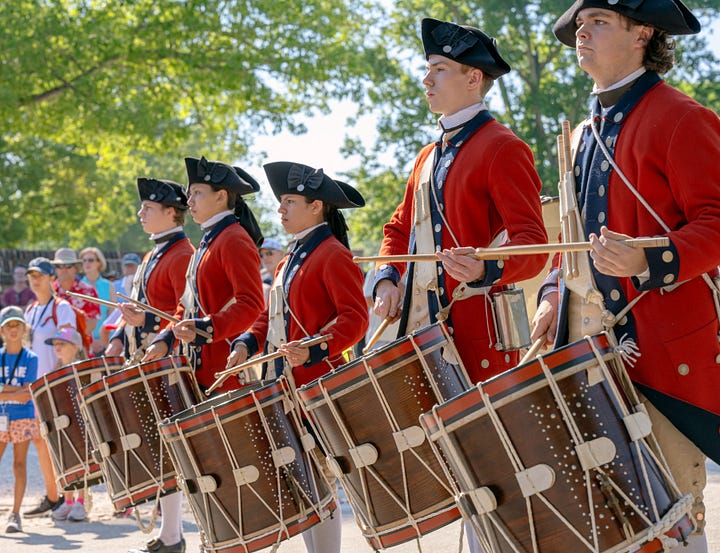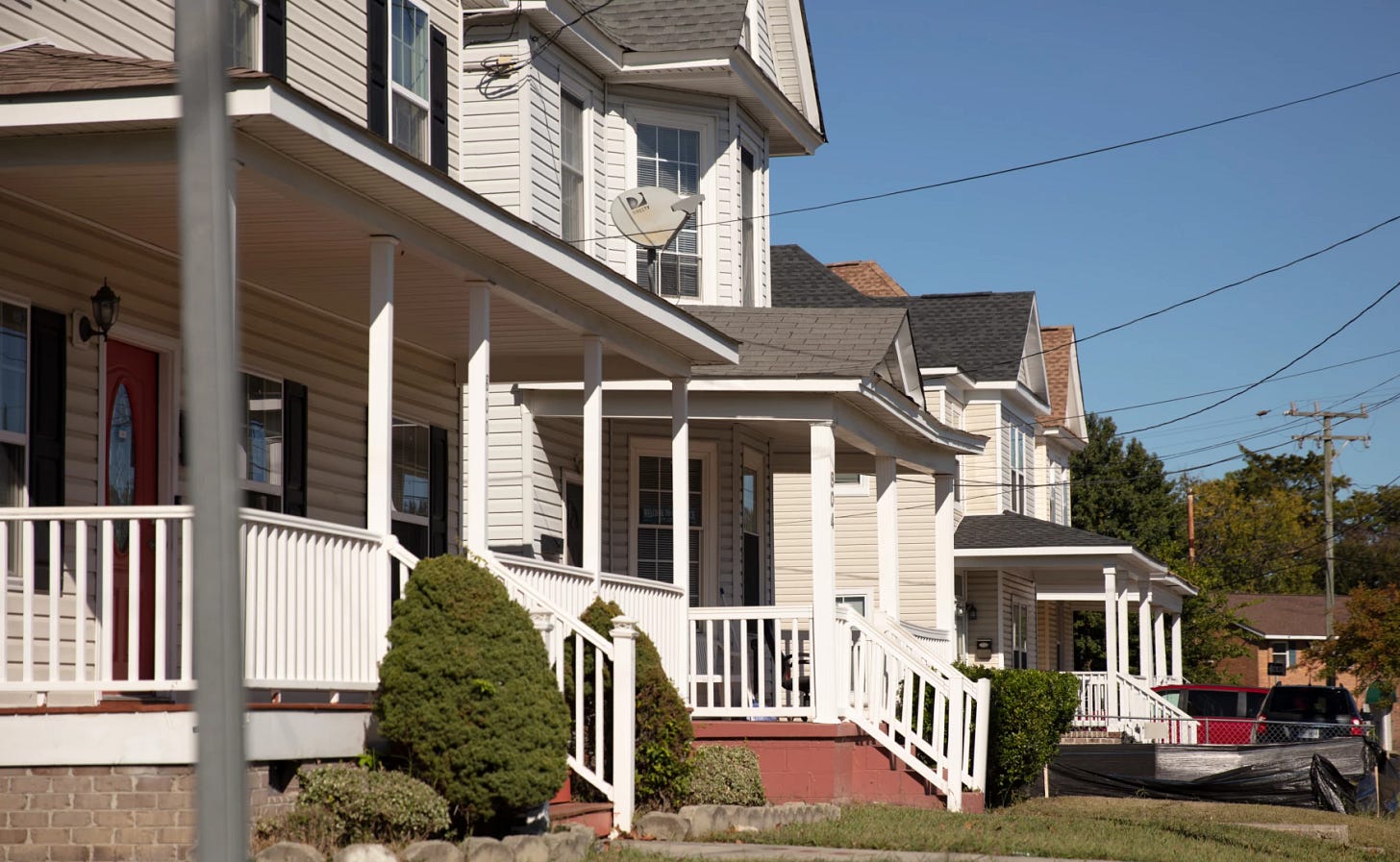Making the grade: WJCC schools consider alternatives to the old 0-100 grade scale
Good morning! WJCC schools say they want to encourage learning by looking at new grading systems....a guide to July 4 fun...and James City County looks at land trusts for housing affordability.
Publisher’s note: this will be our only edition this week; we are taking vacation through the July 4 weekend. Our next edition will be Tuesday, July 8. Happy July 4!
If you want to stir up controversy in your community, talk about making changes to the traditional grading system, as the Williamsburg-James City County schools are doing.
The schools have been piloting a variety of new grading systems for the past two years, we were told by Courtney Mompoint, director of secondary curriculum and instruction.
It would be a change from the current grading system, with a traditional 0-100 point grading scale that is averaged over the course of a school year. Instead, school officials said, they want to help students master subject matter in the way they are most comfortable using and give them continuous feedback on what they need to succeed.
York County schools are not looking at grading pilots, School Chair Kimberly S. Goodwin said.
Among the concepts the WJCC schools looked at:
· Standards-based grading that explains what topics students must master over time and allows them re-does until they get it right
· A 50-100 grading scale
· Allowing students to present portfolios of work in lieu of testing
· A system of rewards that takes its cues from video games
Mompoint’s boss, Superintendent Daniel F. Keever, recognizes changing grading procedures is the third rail of education and requires a lot of proselytizing.
“Sometimes people think, well, you're talking about lowering the standards…. that's absolutely not what we're interested in doing,” Keever said. “What we're interested in doing is (creating) a more consistent system whereby students that are…taking the same course, in the same school, have a similar opportunity to earn marks based on mastery of the work submitted.”
Right now different teachers have different approaches to how they grade work, he explained. Some allow students to get extra credit while another educator teaching the same course in the same grade may not, allowing one group the chance to get better grades.
Mompoint said the goal is to have consistent practices across a school so that students and their parents understand what is expected of students and how they will be measured.
They said educators’ goals should be to prepare students for careers and higher education, not try to catch them doing something wrong.
“In the world of work, usually if you make one mistake, you don't get fired,” Keever said. “You get to learn from that mistake and try to improve so you don't do it again.”
“The end goal is to ensure that you've actually mastered that standard…it gives the students an opportunity to say, you know, I might not have done it well this time, but now my teacher's given me feedback, I know how to do better the next time…if you think about the world of athletics, that's what practice is for.”
A standards-based system would eliminate traditional grades, Mompoint said. Teachers would agree on the knowledge students should master and assess the students based on whether they did so. A student who does not understand the material would be allowed to do additional work until he attains mastery.
A 50-100 grading scale would eliminate the large range between failing and passing, both educators said: even if you achieve 60 points you still get an F, while each higher grade requires only 10 more points to achieve.
“It artificially places a stronger value on failure than it does on success.” Keever said. “We want students to have the opportunity to demonstrate success.”
Gamification takes its cue from video games, allowing tokens and higher levels to encourage students to work harder. It’s not currently being pursued, Mompoint said.
The portfolio theory allows students to opt out of using a test for their grade, substituting a portfolio of work for teachers to assess.
School work groups spoke with dozens of parents, teachers and students to get their feedback on current grading practices, she said. The majority of participants agreed students should have clear goals to master, more feedback to help them improve, and a chance to retake tests or redo their work.
Parents want to know more specifically what is driving the grades, Mompoint said.
Keever acknowledged that providing more feedback can increase teacher workloads, and the schools are looking at various software systems that can help them with the task.
Students and parents aren’t the only stakeholders the schools must convince, Mompoint noted. Many teachers were initially skeptical of changing the way they grade.
Mompoint plans to continue to expand pilot programs across the school system next year. But she said no school will be forced to do a pilot. There is still a lot of discussion and education to do, she said.
“It's not a diminishing of accountability or standards, “ Keever emphasized. “It is working very diligently to hold students to a high standard as they show us in various forms what they learned.”
Keever said he would be happy to talk to any civic group that wants to learn more. He can be reached at engage@wjccschools.org
July 4th Events & Fireworks Roundup


The place where America began is celebrating the nation’s birthday Friday with a day full of events and fireworks displays, from Colonial Williamsburg to Yorktown and Busch Gardens.
Williamsburg:
Colonial Williamsburg is offering a free day of admission to the historic area and the art museums, which you can sign up for here.
Kick off the day watching Thomas Jefferson read the Declaration of Independence from the Capitol balcony at 9:30 a.m., followed by a second reading at the Courthouse at noon. The fifes & drums will march in a salute to the original 13 states at 10:30 a.m. in Market Square North. You can train as a recruit in a new regiment at an interactive military drill at 2:00 p.m., in Market Square North, and cool off indoors at 3 p.m. with vocal and instrumental chamber music celebrating American independence at the Hennage Auditorium.
At 8 p.m. there will be a celebration of words and music of the American Revolution on the Palace Green – bring chairs, blankets and picnics.
The day ends with the 20-minute fireworks display at 9:30 p.m. over the Governor’s Palace. The best viewing spots are Palace Green, Market Square, and the East Lawn of the Art Museum.
Yorktown:
Yorktown’s 46th Annual Independence Day Celebration will feature a parade, bell-ringing, concerts, family games, and a food pavilion.
Events are scheduled throughout the day, allowing families to lounge on the beach, visit local shops, and take part in various activities culminating in a fireworks display over the York River at 9:15 p.m.
Prime viewing locations include the waterfront and Victory Monument.
For convenience, free parking opens at 4:00 p.m. at Yorktown Battlefield, though attendees will have a long walk to the festivities. The Yorktown Trolley will offer free, accessible shuttles from 10 a.m. – 5 p.m.
Meanwhile, Busch Gardens Williamsburg will offer a fireworks extravaganza starting around 9:15 p.m. Attendees must have park admission to enjoy the show.
Closures and Traffic Advisory
Visitors should plan ahead for potential closures and delays. The Yorktown waterfront will close to inbound traffic after the fireworks display, though outgoing traffic will be assisted until 10:15 p.m. Other announced closures specific to the day include adjustments to parking and shuttle services at key areas in Yorktown, ensuring crowds can navigate the festivities safely and efficiently.
July 4 Closings
· All government offices will be closed for the holiday.
· Banks and financial institutions are also closed.
· No postal service operations.
· Some retail stores may have reduced hours or remain closed; check locally for specifics.
City of Williamsburg
All city government offices, libraries and courts are closed.
James City County
All county government offices closed July 4, including Government Center, courts, libraries, Recreation Center, Abram Frink Jr. Community Center
Convenience centers (Jolly Pond, Tewning Road, Toano) & garbage transfer station are closed; recycling delayed to Saturday
Parks remain open; park stores/guest services offices also open
York County
All York County government offices, libraries and courts are closed.
Editor’s Note: An Artificial intelligence program was used in compiling this report.
James City County considers land trusts for affordable housing
By Nick McNamara, WHRO
WHRO is a news partner of Williamsburg Watch
James City County is looking at a new approach to preserve housing affordability as rising home costs outpace national increases.
But before diving in too deep, county staff want to be sure community land trusts are a good fit.
They’ve been studying the model with a consultant since January and will have a feasibility plan by September detailing what it would take to establish and operate a trust.
A community land trust separates ownership of a home from the land it’s on. It works like this: A prospective homebuyer considering a property in a land trust would only have to pay the cost of the house, not the cost of the land. The trust remains the owner of the land and would extend a 90-year ground lease to the homebuyer. The lease can be renewed and inherited like homes can. The trust itself is a nonprofit.
The purchaser also agrees to a resale formula prior to closing to put a cap on the resale price and sets the percentage of the home’s appreciated value that the seller can keep. An agreed-upon portion of the appreciation will go to the trust as equity, which it can use for expenses or buying more homes and land.
“In this way, the (community land trust) can keep the home at a price affordable to the next homeowner,” said Vaughn Poller, James City County neighborhood development administrator.
According to Zillow’s home value index, James City County home values are about $90,000 higher than the national average.
A chart comparing home sale prices shows James City County outpacing national rates.
Poller said expected county developments on Clark and Moses lanes could present a first opportunity for the trust to get off the ground. Forty-five affordable homes are approved for construction on Clark Lane.
Though novel to James City County, community land trusts go back more than 50 years to the Civil Rights Movement. The first, New Communities, Inc., was a farm collective created in 1969 to support rural Black growers in Georgia. It reached across 6,000 acres at its peak, and has become a model for land trusts nationwide.
There are now about 350 community land trusts across the U.S., including Richmond, Charlottesville and Lynchburg.
Details on who could qualify for the program will be worked out during the feasibility plan, but Poller said the focus would be on people making low to moderate incomes. The exploration will also consider whether the model replicates existing affordable housing initiatives in the county, and whether a trust could be more effective.
Poller said he expects that will be the case with James City County’s use of deeds of trusts on affordable housing developments. The deeds, lasting 10 to 15 years, allows the county to recoup public investment in affordable housing. It works by taking a cut of the sale of a home to pay back the subsidy the county provided an individual or developer for things such as mortgage assistance or lowered interest loans.
“While this is no better than no money at all, the amounts recaptured are not enough to replace the unit sold,” Poller said. “Once the previously affordable unit sells, it is no longer affordable; it becomes market-rate.”
A future trust’s organizational structure would also need to be worked out. Community land trusts are typically established as nonprofits with tripartite governance; often, a third of the board of directors are selected by residents in the trust, a third selected by community stakeholders and a third appointed by an entity such as the local government.
“The trust, itself, would not necessarily be county-owned or operated,” Poller said.
Financing the trust is another lingering question the feasibility plan will detail. Board of Supervisors Vice Chair John McGlennon questioned if the county will set up initial funding for the trust and if other stakeholders could be incentivized to invest. He said uncertainty about federal funding also has to be considered.
The board, while generally optimistic about the program, wanted to see results from the five trusts in Virginia.
“How do they ensure the focus is kept on what we want to do and it doesn’t evolve into something that then becomes more of a problem than it is a solution?” said Chair Jim Icenhour.
Guest Opinion
Reflections on July 4 and Freedom
By Steven Woolley
July 4 is nearly here -- time to reflect on some of the conditions that led to our Declaration of Independence.
King George III plays the villain’s role in the Declaration, and rightly so—he served as a symbol of a more complex set of failures. Parliament, the bureaucracy, the mercantile elite, and the Church were among the institutions that failed to recognize the legitimate needs of their fellow citizens in the 13 colonies. Ordinary people were increasingly aware that they were being treated with disregard bordering on contempt.
We were fortunate that colonial leaders were determined the new nation would be a democratic republic in which the voice of the people would always be heard and no king would rule. The Constitution was the second try—and it turned out to be a political masterpiece, laying the foundation upon which we’ve continued to build toward the fulfillment of the promise that every person would be secure in life and liberty, with an equitable opportunity for a prosperous life.
There are some similarities between the conditions that resulted in the War of Independence and what many Americans feel they are experiencing today.
Read the rest of Steve’s column here.
Passings
Ronald Chester Glidden, 86, June 29.
Forrest Lester Fenstermaker, 91, June 29.






My fear is that it will result in exactly the "diminishing of accountability or standards" the superintendent mentions. Already, a student can refuse to do any work at all in a class, and the burden falls on the teacher to justify why the student should fail, including having to contact the family personally; school policy makes it so difficult and labor-intensive for a teacher to fail a student that it's simply easier to give the student an undeserved passing grade, artificially inflating the school's pass rates--and principals encourage it, because it makes them look more effective. A new grading system that provides more feedback and multiple "re-does" [sic] for every student will place an even greater burden on teachers, and "We want students to have the opportunity to demonstrate success" sounds like division-speak for "We want to make ourselves look pioneering and innovative at the expense of overburdened classroom educators actually doing the hard work on the front lines."
Society needs to stop mollycoddling our children. Stop trying to make everything easier. As it is, children growing up today have the attitude that if they have to work hard for what they want, they quit. They already do not understand work ethics, working for what they want, or discipline. If it is not easy, or they don't earn $100,000/year right out of high school, they want no part of it. They think everything should be given to them, for free and because they want it, without any regard as to how to pay for it. Why are we not teaching them old school ethics and discipline, manners, and good old-fashioned hard work? Kids today have never felt the sense of accomplishment for having completed a task on their own.